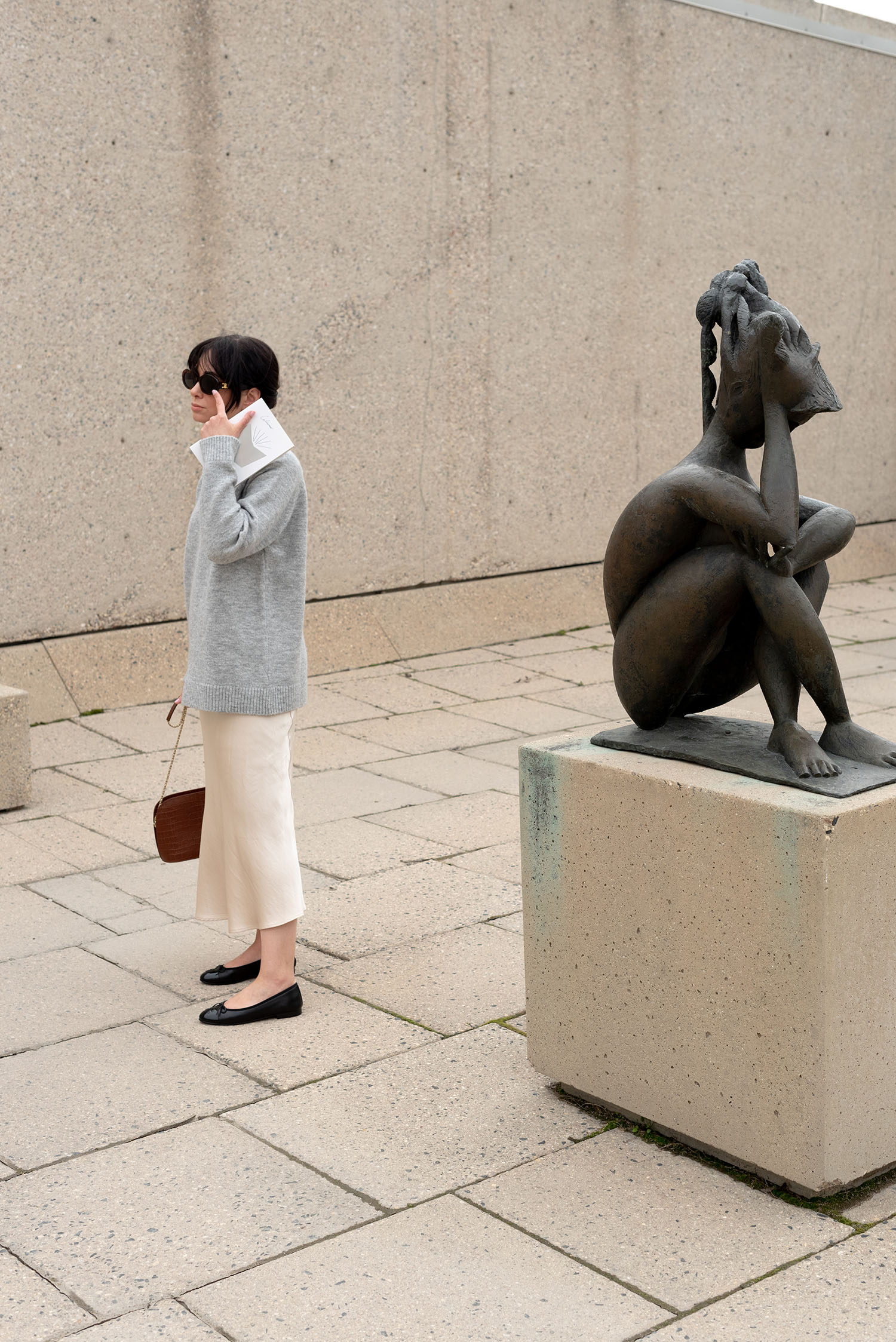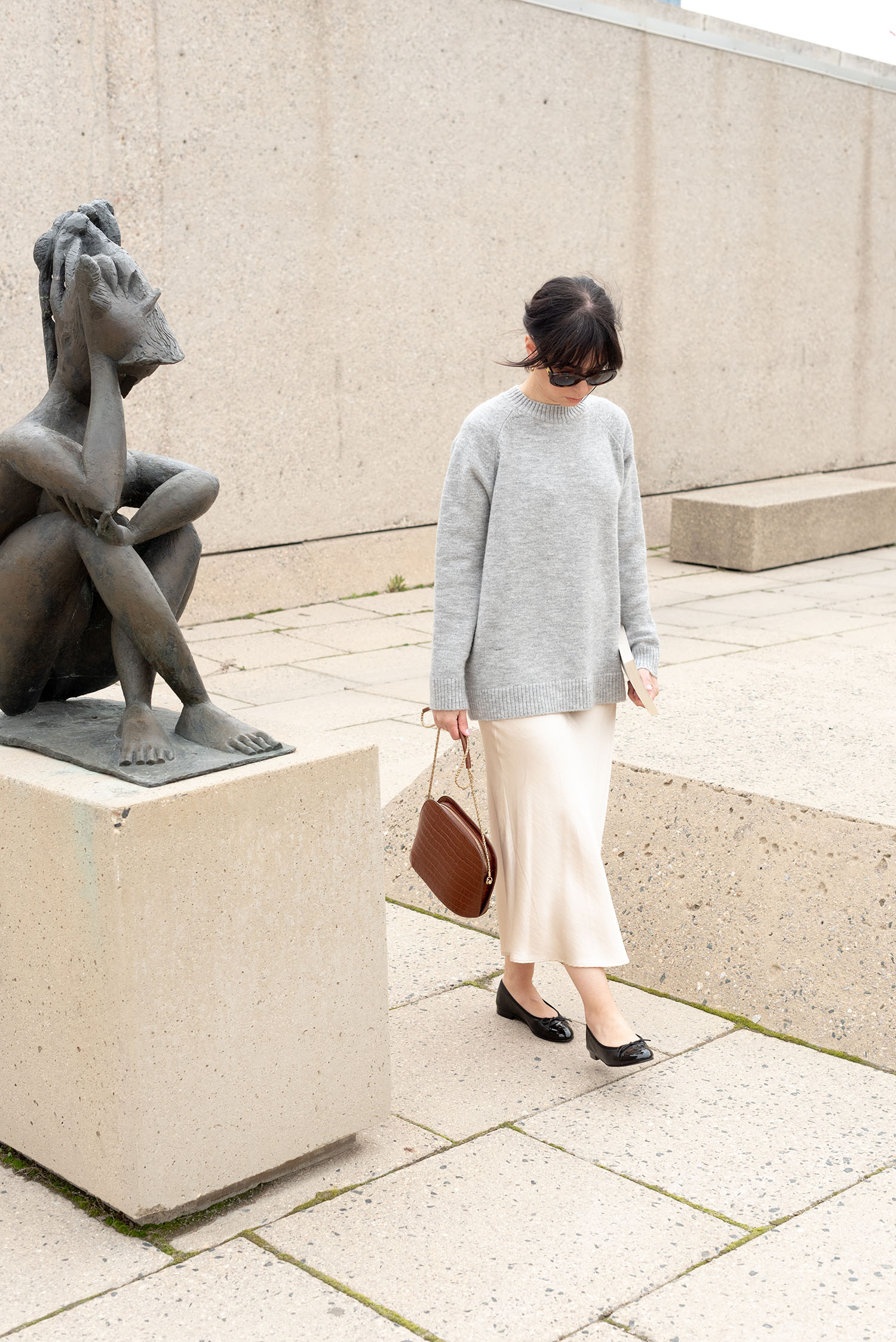

Pixie Market skirt
Chanel flats
Sezane bag
Celine sunglasses
Linjer rings
Mejuri earrings (similar)
Location: Winnipeg Art Gallery – Winnipeg, Manitoba
Book: If on a Winter’s Night, a Traveler by Italo Calvino
Finally, after months, we make a (brief) return to books. And I can’t think of a better book, or author, to return with than If on a Winter’s Night, a Traveler, by Italo Calvino.
Calvino, who is not as widely read now, was a prolific writer and editor, a reformed communist, and the most translated contemporary Italian writer at the time of his death in the mid-eighties. The date and time of his death are significant, to me. He died the day I was born: September 24, 1985.
I didn’t know that, when I first stumbled upon Calvino’s work at McNally Robinson in my mid-teens. Mariner Classics, then an imprint of Houghton Mifflin Harcourt Publishing Company (which has since been acquired by Harper Collins), published beautifully translated versions of his books with white covers and black, handwritten titles. They looked like nothing else on the shelves (and, frankly, still don’t.) They drew me in instantly. But there were so many to choose from, and each one was so beautiful. It was impossible to know which to pick. I returned to them over and over again, on the many afternoons I spent browsing the store with no money to actually buy any books, always with a sense of inexplicable familiarity. I needed to read these books – I just didn’t know why.
Because I’m fanciful, I imagine that we take a long journey between existence in this form and in the next one. And that, like anywhere that people travel, there are cafes and rest stops along the way. I can envision myself, on the day I was making my way into the world – late, but unhurried, pausing in a crowded cafe for a cup of tea. A man walks in, orders a cappuccino and turns, realising there is nowhere to sit except the chair across from me. He asks to join me, and I agree. We begin a conversation about nothing of note. We’re travelling in opposite directions, and won’t meet again. But he’s charming, clever, quick-witted. I enjoy the time we spend together.
When I finish my tea, I stand up, and wish him well on his travels. This isn’t really good-bye, he assures me, because nothing is – we live in a continuum, and always loop back to the people we’re supposed to connect with in the end. “And I’m still there, in print,” he tells me, meaning in the world I’m on my way to join. “You’ll find me someday, in a book shop.”
As I walk out, I’m surprised to realise that I’m looking forward to it.
It’s a nice story, anyway. Of course in reality I never met Calvino, because he made his exit from existence just as I was making my entrance. But I’ve read so many of his books so often that it almost feels like I might have known him. If on a Winter’s Night, a Traveler is one of my favourites because it isn’t just one book, but many novels, or parts of them, contained within one broader story about readers and writers.
Calvino said that he approached writing novels by asking himself what sort of book he might like to read next, and then writing it. The approach is original, and a bit humorous, which is exactly the kind of writer he was. In If on a Winter’s Night, a Traveler, he invents cultures and languages seemingly for the sheer pleasure of doing so. The villain is a malevolent translator, irritated by his girlfriend’s love of reading, who sets out to destroy the hobby she adores. When described, the plot sounds, frankly, ludicrous. And I suppose, in some ways, it is. But it’s also wonderfully funny, impeccably crafted and told by someone whose love of language and storytelling is apparent on every page.
Calvino was an enthusiastic reader as much as he was a prolific writer. He openly admired other authors, speaking exuberantly about his love for their style in his other works. Stendhal, Pushkin, Manzoni – even G. K. Chesterton. In their writing, he found something worthy of admiration.
The question that this brings forth, for some readers, is whether love of anything can be so widely offered and still retain its significance. When, Nerve Emre asks, writing for The New Yorker, does multiplicity shade into duplicity and superficiality? At some point, perhaps, but not in Calvino. And especially not in If on a Winter’s Night, a Traveler, where the plot is an elaborate joke of sorts. Certainly, though there is seriousness in it, it isn’t meant to be taken seriously, but to be enjoyed. And that, I suppose, is what I love best about Calvino. The belief he espouses constantly, that reading is enjoyable. That all books, no matter their subject matter, were meant to entertain. And that in that way, they are all equal.
Too often, we get caught up in classifying books. We debate whether they qualify as literature or are simply meant to be consumed for entertainment, no better than an episode of television. And we pass judgement on readers who choose the books we deem silly and superficial, because we live in a world with books by Stendhal and Pushkin. But we love what we love, whether it is serious, silly or both at once… and the point is that we read, not what we read. Many of you might prefer a more traditional novel to one like If on a Winter’s Night, a Traveler, which refuses to begin but ultimately ends. All books must, their subject matter or perceived quality is immaterial. In that way, too, they are all the same.
Like all true reading enthusiasts, Calvino lamented the inability to ever read enough. There is a near infinite amount of books, and we all have a finite amount of time. In If on a Winter’s Night, a Traveler, he gives us the illusion of a solution – dozens of books all in one. But at the same time, he contributes to the problem. When we put down this book, we will want to pick up another of his dozens of literary works, thus adding to the list of books we want to read but may never have time to read. It’s an irony that, if not intended, he would certainly have appreciated.
This month is Calvino’s centennial. He was born on October 15, 2023. If you haven’t read him yet, there’s no better time to pick up one of his (many) books. Or at least to add one to your reading list. The author will understand if you never find the time to actually read it.
Oh my, those Chanel ballet flats are perfection!! Love them with this beautiful outfit, and LOVE your Celine sunglasses so much too. Really debating if I might grab a black pair later this year. I didn’t read too much over the summer, but excited to be back at it and reading a fun & witty romantic comedy. As you know, I usually read finance and business strategy books (aren’t I a hoot) but excited to be entering my novel era. Will definitely add this one to my list xo
Hearted Life (life + style blog)